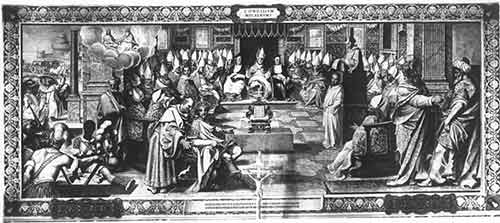My post discussing the value of not using the Nicene Creed at ordinary Sunday Eucharist received good discussion and was continued in part 2 with a promise of a further post on that idea.
Fr Donald Schell sent me a document by Fr Rick Fabian arguing not to use the Nicene Creed regularly in the Sunday Eucharist. I am grateful to have permission to quote from this. I quoted part of it in the last post, and will quote further from it here:
RECITING THE “NICENE” CREED EVERY SUNDAY IS AN INNOVATION, NOT ANGLICAN TRADITION.
“Nicene” Creed recitation spread slowly westward, and was long resisted in England, a country noted for good liturgy: there it squeezed into the byzantinized Sarum use only in the 15th century—just in time for Cranmer to include it in his Prayer Book. Even so, the failure of Prayer Book worship under the Stuarts and Puritans meant that by mid-seventeenth century Anglicans had dropped the “Nicene” Creed (along with the Prayer Book) from Sunday worship, like several continental Reformed churches. And it remained dropped, because the 1688 Restoration brought back the BCP but not the Sunday Eucharist. In North America only Calvinist colonists celebrated weekly Eucharists–without that Creed; American Episcopalians did not. Outside Anglo-Catholic ritualist missions in the midwest, most Episcopalian Sundays remained non-eucharistic for two hundred years until after World War II, and the “Nicene” Creed was heard only on the three yearly feasts the Creed mentioned: Christmas, Easter, and Pentecost.The 20th century Liturgical Movement brought Episcopal parishes communion at the main service monthly: that’s the Episcopal Church I grew up in. This change naturally raised pressure for further reform, bcause under the 1928 Prayer Book eucharistic rite the “Nicene” Creed was the only thing laypeople could say without accusing themselves. (Compare people’s joyful affirmations at Morning Prayer, and contemporary Roman Catholic devotions!) Hence few objected when the 1979 BCP, making Eucharistic worship our norm, brought the “Nicene” Creed into most Episcopalians’ regular weekly worship for the first time. In practice, allowing for other creeds at baptisms, weddings and when the eucharist follows Morning Prayer, BCP rubrics often brought “Nicene” Creed recitation into the main Sunday service alone. Moreover, here was a compromise among long-held parish traditions, and as an innovation it remains properly subject to feedback. Feedback since 1979 suggests it would better have been set forth as a norm, like some other Anglo-Catholic favorites, rather than a flat rule—something other renewed Protestant rites avoided.
GREAT THANKSGIVING PRAYERS ARE THEOLOGICALLY SUPERIOR.
The Cappadocians established as an orthodox theological principle, in the late Richard Norris’s words: “We don’t know anything about God; we only know what God does.” The Great Thanksgiving Prayers are wholly doxological, focused on God’s actions and our faithful response to those, rather than on our thoughts. By contrast the “Nicene” Creed speaks rhetorically about us: even though God may be the subject of most verbs, each paragraph opens setting us believers on top. That rhetoric may suit catechesis and doctrinal arbitration, where creeds properly arose, but it hardly suits worship. And that rhetoric explains the resistance of some thoughtful churchfolk as well as newcomers, who object that reciting the “Nicene” Creed makes them tell lies about what they truly think. –Whereas the same folks rarely complain about Eucharistic prayers praising God’s work through a story of creation and salvation. As substitutes for classic creeds, the New Zealand Prayer Book offers recitable texts that are also wholly doxological: one reason for that Prayer Book’s broad appeal. But liturgical economy alone—doing each action once—argues for a different answer, already in place.Now that Episcopalians increasingly borrow or write Great Thanksgiving Prayers (a usage encouraged in our BCP Rite III, and spreading today) we might well turn to writing these well. Since 1979, rubrical standards have focused on elements considered ecumenically significant, such as an explicit epiclesis or a Pauline Last Supper narrative—just to cite two features which even some ancient models lack. We might now re-direct attention onto features which more clearly express our Christian identity. Our official prayers do a fine job here (see #4, above), but the BCP and other official publications give little guidance for extemporaneous or written innovation. Until now conformity to the BCP was the effective means to ensure good prayer-saying in Episcopal Churches; but now our ecumenical situation alone requires opening new dialog where literal rules may never again be adequate. We must begin to talk about what Christians really mean when we pray together. Reciting the “Nicene” Creed or a substitute text can never fill that job the way Great Thanksgiving Prayers can do.
This is the twelfth post in a series on the Creed.
The first is Apostles’ Creed.
The second is I believe in God.
The third is a source of the Apostles’ Creed.
The fourth is I believe in the Father.
The fifth is Handing over the Creed.
The sixth is I believe in Jesus Christ, God’s only Son
The seventh is Don’t use the creed in worship
They eighth is Truly God truly human
The ninth is Conceived by the Holy Spirit
The tenth is Don’t use the creed in worship (part 2)
The eleventh is Born of the Virgin Mary
image source The Council of Nicaea Fresco in the Sistine Salon, Vatican.




I don’t think this quotation has a very firm grasp of 17th-century history. The Nicene Creed has always been a part of the Communion orders of the reformed Church of England. Even though there were Sundays at which no one communicated, the Ante-communion was still celebrated, along with its Nicene Creed. An appeal to what the Westminster Directory did cannot be normative to Anglicanism. While I am favourable towards the principle here, this quotation reads as a piece of historical legerdemain: it wasn’t like that!